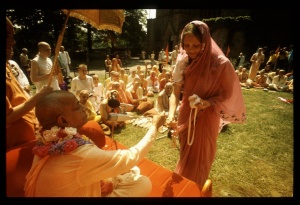CC Madhya 1.120 (1975): Difference between revisions
(Vanibot #0027: CCMirror - Mirror CC's 1996 edition to form a basis for 1975) |
(Vanibot #0020: VersionCompareLinker - added a link to the Version Compare feature) |
||
| Line 2: | Line 2: | ||
<div style="float:left">'''[[Sri Caitanya-caritamrta (1975)|Śrī Caitanya-caritāmṛta (1975)]] - [[CC Madhya (1975)|Madhya-līlā]] - [[CC Madhya 1 (1975)|Chapter 1: The Later Pastimes of Lord Śrī Caitanya Mahāprabhu]]'''</div> | <div style="float:left">'''[[Sri Caitanya-caritamrta (1975)|Śrī Caitanya-caritāmṛta (1975)]] - [[CC Madhya (1975)|Madhya-līlā]] - [[CC Madhya 1 (1975)|Chapter 1: The Later Pastimes of Lord Śrī Caitanya Mahāprabhu]]'''</div> | ||
<div style="float:right">[[File:Go-previous.png|link=CC Madhya 1.119 (1975)|Madhya-līlā 1.119]] '''[[CC Madhya 1.119 (1975)|Madhya-līlā 1.119]] - [[CC Madhya 1.121 (1975)|Madhya-līlā 1.121]]''' [[File:Go-next.png|link=CC Madhya 1.121 (1975)|Madhya-līlā 1.121]]</div> | <div style="float:right">[[File:Go-previous.png|link=CC Madhya 1.119 (1975)|Madhya-līlā 1.119]] '''[[CC Madhya 1.119 (1975)|Madhya-līlā 1.119]] - [[CC Madhya 1.121 (1975)|Madhya-līlā 1.121]]''' [[File:Go-next.png|link=CC Madhya 1.121 (1975)|Madhya-līlā 1.121]]</div> | ||
{{CompareVersions|CC|Madhya 1.120|CC 1975|CC 1996}} | |||
{{RandomImage}} | {{RandomImage}} | ||
==== TEXT 120 ==== | ==== TEXT 120 ==== | ||
<div class="verse"> | <div class="verse"> | ||
: | :brahma-saṁhitā, karṇāmṛta, dui puṅthi pāñā | ||
:dui pustaka lañā āilā uttama jāniñā | :dui pustaka lañā āilā uttama jāniñā | ||
</div> | </div> | ||
| Line 18: | Line 17: | ||
<div class="synonyms"> | <div class="synonyms"> | ||
brahma-saṁhitā—the book named Brahma-saṁhitā; karṇāmṛta—the book named Kṛṣṇa-karṇāmṛta; dui—two; puṅthi—scriptures; pāñā—obtaining; dui—two; pustaka—books; lañā—carrying; āilā—came back; uttama—very good; jāniñā—knowing. | |||
</div> | </div> | ||
| Line 25: | Line 24: | ||
<div class="translation"> | <div class="translation"> | ||
Śrī Caitanya Mahāprabhu also found two other | Śrī Caitanya Mahāprabhu also found two other books-namely, Brahma-saṁhitā and Kṛṣṇa-karṇāmṛta. Knowing these books to be excellent, He took them to present to His devotees. | ||
</div> | </div> | ||
| Line 32: | Line 31: | ||
<div class="purport"> | <div class="purport"> | ||
In the olden days there were no presses, and all the important scriptures were handwritten and kept in large temples. Caitanya Mahāprabhu found | In the olden days there were no presses, and all the important scriptures were handwritten and kept in large temples. Caitanya Mahāprabhu found Brahma-saṁhitā and Kṛṣṇa-karṇāmṛta in handwritten texts, and knowing them to be very authoritative, He took them with Him to present to His devotees. Of course, He obtained the permission of the temple commander. Now both Brahma-saṁhitā and Kṛṣṇa-karṇāmṛta are available in print with commentaries by Śrīla Bhaktisiddhānta Sarasvatī Ṭhākura. | ||
</div> | </div> | ||
Latest revision as of 04:55, 27 January 2020

A.C. Bhaktivedanta Swami Prabhupada
TEXT 120
- brahma-saṁhitā, karṇāmṛta, dui puṅthi pāñā
- dui pustaka lañā āilā uttama jāniñā
SYNONYMS
brahma-saṁhitā—the book named Brahma-saṁhitā; karṇāmṛta—the book named Kṛṣṇa-karṇāmṛta; dui—two; puṅthi—scriptures; pāñā—obtaining; dui—two; pustaka—books; lañā—carrying; āilā—came back; uttama—very good; jāniñā—knowing.
TRANSLATION
Śrī Caitanya Mahāprabhu also found two other books-namely, Brahma-saṁhitā and Kṛṣṇa-karṇāmṛta. Knowing these books to be excellent, He took them to present to His devotees.
PURPORT
In the olden days there were no presses, and all the important scriptures were handwritten and kept in large temples. Caitanya Mahāprabhu found Brahma-saṁhitā and Kṛṣṇa-karṇāmṛta in handwritten texts, and knowing them to be very authoritative, He took them with Him to present to His devotees. Of course, He obtained the permission of the temple commander. Now both Brahma-saṁhitā and Kṛṣṇa-karṇāmṛta are available in print with commentaries by Śrīla Bhaktisiddhānta Sarasvatī Ṭhākura.